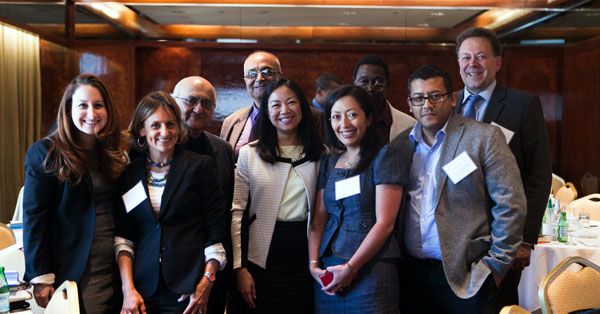By Rachel Quint and Sarah Lucas, originally published on the Post-2015 Data Test website in November 2014.
Bringing Country-Level Realities to Global Ambitions (Part 1):
4 Key Takeaways from the Post-2015 Data Test’s Presentation of Initial Findings
On October 14 in New York City, across the street from the hallowed halls of the United Nations, a group of scholars from Bangladesh, Canada, Peru, Sierra Leone, Senegal, Tanzania, and Turkey, came together to talk about data. Under the auspices of the Post-2015 Data Test, these scholars have spent the last year trying to answer one question — “How well prepared are these countries to measure progress on the Post-2015 development goals and targets?”
The Post-2015 Data Test – an initiative through which seven country teams are assessing the quality and availability of country-level data to measure progress on proposed post-2015 goals – held events in New York and Washington, D.C. to share the initial results from their work and to discuss implications for the Data Revolution and post-2015. Hosted by the UN Foundation in New York and the Center for Global Development in Washington D.C., the events brought together a wide range of stakeholders, including country team members, representatives from UN missions and agencies, civil society organizations, the private sector and the UN Secretary General’s Expert Advisory Group on the Data Revolution.
Here are four interesting (but not all-encompassing) takeaways from the New York event.
1. Countries have a long way to go to meet the technical data needs. While on average the data availability and quality are best (but still not great in most countries) in closely-watched areas like poverty, education, growth and employment, they are much worse in areas that weren’t in the Millennium Development Goals but are under negotiation for the post-2015 Sustainable Development Goals (SDGs) – governance, human rights, environment. They are worse yet when trying to understand the experiences of specific segments of the population in a given country – like women, ethnic minorities, geographical locations – rather than national experience as a whole. This inspires an action agenda around increased data coverage, quality, consistency, disaggregation, timeliness, and so on. This is part of what people talk about when they say we need a “data revolution.”
2. A combination of global and local targets and indicators would be (very) complicated, but could work. The Post-2015 Data Test included a set of global targets for seven goal areas – poverty, education, employment and inclusive growth, energy and infrastructure, environment, governance, and global partnership – that all teams examined in their studies. Teams were also asked to select country-specific targets and indicators that resonated with country priorities. Once country teams selected their subset of metrics, they then investigated the availability of data for both the ‘global’ and ‘national’ level targets and indicators. Teams expressed enthusiasm for this global-local framing (and Special Advisor of the Secretary-General for Post-2015 Development Planning, Amina Mohammed cited this enthusiasm as “good news”), but the experience also revealed a lot of tricky questions about how we can have common goals that are both a rallying cry at the global level, yet meaningful at the country level.
3. A post-2015 architecture will need to take into account political incentives. In order for the post-2015 architecture to work, countries need resources to help achieve the goals they commit to, technical support to meet data requirements to measure progress, and a creative political design that creates incentives for accountability. Countries have to make bold post-2015 commitments at home and on the global stage, some of which they don’t currently have the resources or capacity to meet. Debapriya Bhattacharya, one of the leads on the Data Test, described the three reasons why countries might take this risk. The first is the hope of predicable, additional funds to help them solve country-level challenges. The second is the potential for partnership to solve problems that no one country can solve alone, such as climate change. And the third is the chance to push for agreement by other countries to address issues over which developing countries have little control, such as limiting international financial shocks. Will these existing incentives be sufficient to keep countries “on-the-hook” for post-2015 commitments? Or will new incentives need to be built in to the post-2015 architecture?
4. Intra-governmental dynamics will significantly impact goal-setting and implementation. Observers of the Post-2015 process focus a lot on dynamics between country governments. But what about what happens within them? When discussing both the negotiation and implementation stages of the Post-2015 agenda, national representatives spoke about lack of coordination within governments to be a major challenge. For example, ministries of foreign affairs, who are leading negotiations, rarely talk with line ministries who have substantive leadership in many areas covered by the goals, or with national statistical offices who manage data necessary to measure them. Lack of communication between ministries and mismatched priorities between federal and local governments was cited as one of the barriers to designing a post-2015 architecture, and to implement the SDGs.
So, how can the global community address these issues in the next year as the Post-2015 agenda takes shape? Stay tuned for Part 2 of this blog, in which we outline the role that Southern think tanks can play in this.



